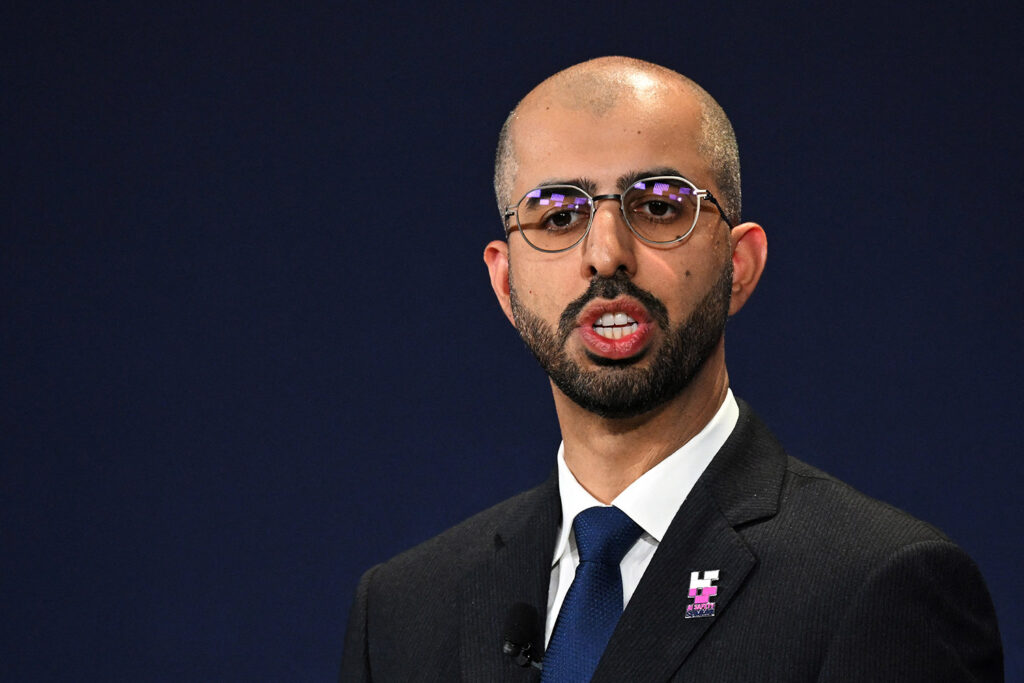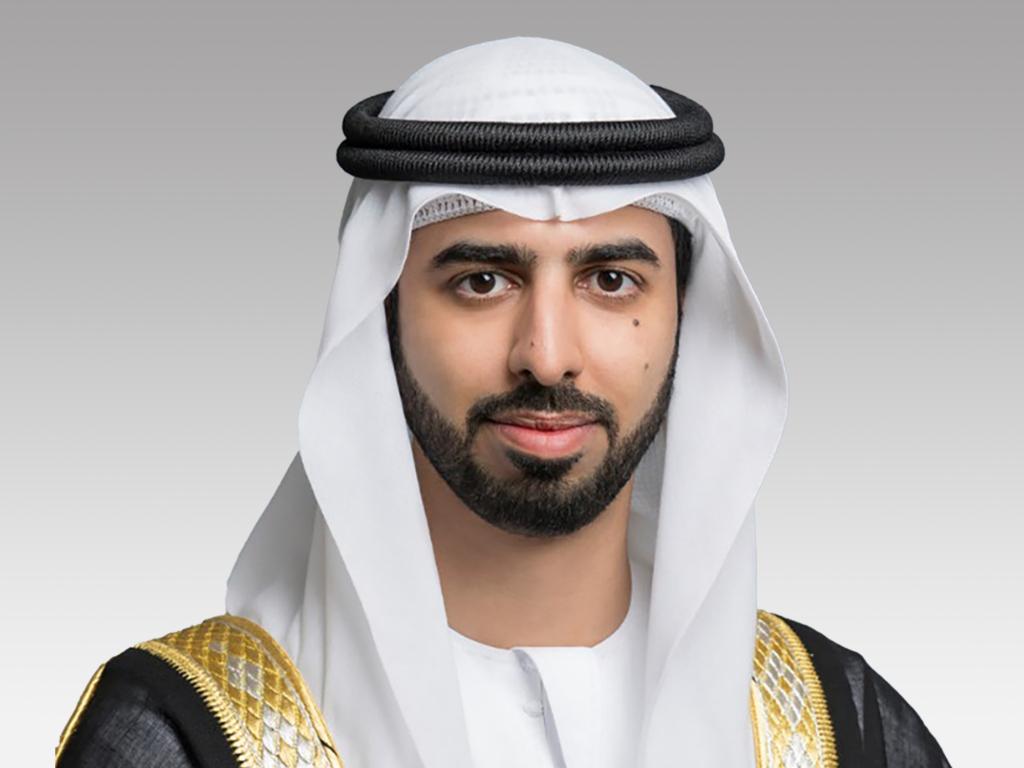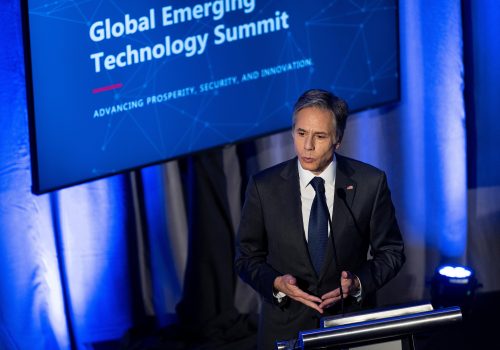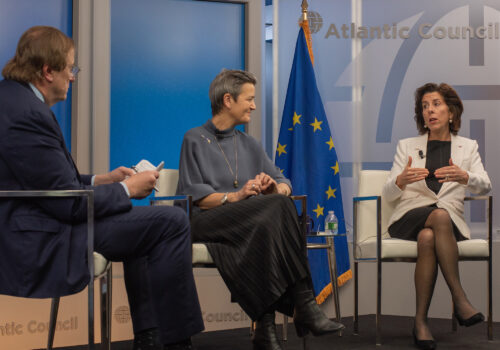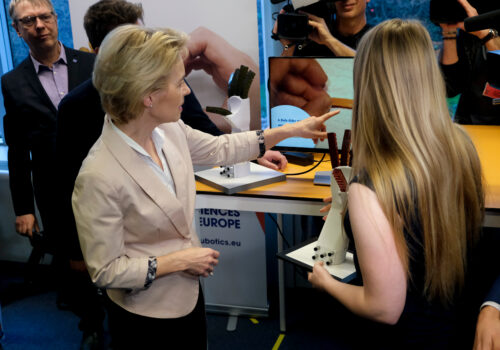Watch the event
The United Arab Emirates (UAE) hasn’t been shy about its ambition to become a global leader on artificial intelligence (AI). The Gulf nation became the first in the world to appoint an AI minister back in 2017, and has hosted a number of top tech emissaries, from Microsoft’s Satya Nadella to Nvidia’s Jensen Huang, in recent months.
Naming its landmark 2022 AI model “Falcon LLM” after its national bird, leaders in the country of ten million have aimed to position themselves as players in the AI arms race dominated by the United States and China—while trying to diversify their historically oil-dominated economy.
Speaking at an Atlantic Council Front Page event on Friday, Omar Sultan Al Olama, the UAE minister of state for artificial intelligence, digital economy, and remote work applications, said we should expect a lot more AI ministers around the world in the coming years.
“AI is going to be the new lifeblood, the new foundation for most governments—and for the private sector as well—and we need to have more focused government positions that are able to really look at the impact of the technology and are able to steer it.”
Here are some of the most telling takeaways from Al Olama’s conversation with Steven Overly, host of the POLITICO Tech podcast.
A ‘marriage’ with Microsoft
- On Monday, Microsoft announced that it would be investing $1.5 billion in G42, an Abu Dhabi-based AI firm. The collaboration aims to pair Microsoft’s LLM research and other technologies with the UAE’s burgeoning AI workforce, which has already quadrupled from 2001 to 2023 to include 120,000 workers, according to Al Olama.
- Comparing the deal to a “marriage,” Al Olama said it doesn’t just represent a technological match, but a cultural one. “I don’t think a company the size of Microsoft, with the letter and backing of the US government, is going to go into business and actually invest in a company if there weren’t reassurances that they see eye-to-eye and operate with a similar culture, similar mentality, and similar moral, strategic grounds.”
- Is aligning with Microsoft a sign that the UAE is siding with the United States over China? Al Olama didn’t embrace the idea, emphasizing instead that the future of AI technology can’t be a zero-sum game and must include all international stakeholders. “Any party being excluded from a global conversation is negative, and the reason for that is this technology can go sideways,” Al Olama said.
- Al Olama went on to compare the increasingly heated AI conversation to the way competing nations had to navigate the nuclear arms race during the Cold War. “There were conversations that were taking place between the adversaries at the time to actually understand what should or should not be done, and how they could maneuver this very delicate environment.”
Addressing the second-order impacts of AI
- With the UAE making global news in recent days after a shock storm dumped a decade’s worth of rain on the streets of Dubai and Abu Dhabi, Al Olama emphasized that AI and other technologies will inform their future responses. “It’s something we couldn’t have prepared for, but what you’re going to see next time is that we will be better prepared to leverage technology to help forecast better and ensure that people have less of an inconvenience when these events occur.”
- When asked about training AI while protecting privacy and copyright laws, Al Olama said that as the public becomes more attuned to safeguarding their data (and not giving it away for free), the technology will shift accordingly. “We were at one point a wild, wild West,” he said. “As we go forward, it’s going to become much more difficult for you to crawl the Internet and collect everything that’s available.”
- Such questions should be answered by a consortium of international experts, both from technology and public policy backgrounds, Al Olama said, which is why he also predicted a growing trend of governments appointing AI-focused officials like himself to navigate such thorny challenges. “There is an element here that is really very subjective . . . So we need to really engage the public and try to understand where they feel like the pain points are higher.”
- However, even as governments pursue thoughtful regulation, Al Olama was careful to point out that there was no placing this genie back in the bottle. “Most governments that have just gone and banned technologies because they didn’t understand them, or because they felt like a trade-off was too large, have backtracked. I don’t think it’s healthy to do that, especially if the decision was based on ignorance.”
Nick Fouriezos is a writer with more than a decade of journalism experience around the globe.
Watch the event
Further reading
Thu, Mar 14, 2024
Leveraging generative artificial intelligence to outcompete strategic rivals
Issue Brief By Jeffrey Cimmino, Andrew A. Michta
The United States and its allies must leverage generative artificial intelligence to outcompete strategic rivals.
Wed, Jan 31, 2024
If the US and EU don’t set AI standards, China will first, say Gina Raimondo and Margrethe Vestager
New Atlanticist By Katherine Walla
The standardization of technologies is already being dominated by nonmarket and Chinese players, the two officials warned at an AC Front Page event.
Thu, Feb 8, 2024
Is the EU missing another tech wave with AI?
Econographics By Ryan Murphy
Policymakers in the United States and European Union view generative AI as one of the technological “commanding heights” of the coming decade. Are EU startups falling behind on funding?
Image: UAE Minister of State for Artificial Intelligence Omar Sultan Al Olama speaks at the AI Safety Summit at Bletchley Park in Bletchley, Britain on November 1, 2023. Leon Neal/Pool via REUTERS
